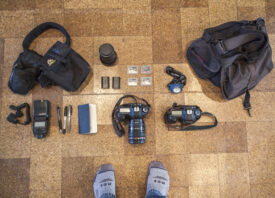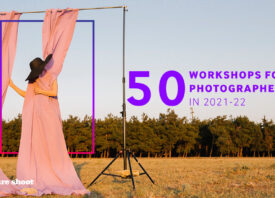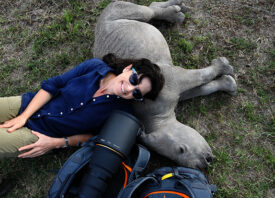Search this site
Touching Portraits of Disabled Russian Orphans Taken by Ten Photographers
 Anastasia Rudenko, Nelidovo Rehab Center
Anastasia Rudenko, Nelidovo Rehab Center
Life in Motion reveals a side to Russia’s orphanages less reported. The project, led by photographer Ed Kashi, was the incentive of the NGO Happy Families, whose aim it was to utilize images taken by ten photography graduates to raise awareness towards the need for public access for the disabled in Russia, as well as the potential for an accessible adoption system.
With the graduates hailing from New York’s International Center of Photography and the Rodchenko Moscow School of Photography, Life in Motion captures the young subjects of Russia’s much disputed childcare system under a prismatic light. “What is most palpable,” asserts Kashi, “is the individual personality of the photographer. Some approached the project with a real hyper-intellectuality, some were very emotional, others detached, or they were really photographically engaged.” For most of the American photographers it was a visual documentation of their first time in Russia. “It was intense for them,” says Kashi, “it was a more emotional, more massive experience.”
Kashi’s instructions to the group were simple: stay out of the caretakers’ way, maintain the subjects’ dignity, be respectful and find intimacy. Due to the delicacy of the subject matter, obtaining the access necessary to achieve any meaningful picture was no easy task. As well as the severity of some of the children’s mental disability, Kashi recalls other obstacles that made engagement with the subjects and their environment something of a challenge. “Some of the admin staff were the hardest folk. They didn’t get it and wouldn’t give permission.” This lack of cooperation, he continues, comes with a territory where showing up with a camera is not only viewed as intrusive but also compromising for those whose livelihoods depend on the institution’s good reputation.
Certainly in Western media, Russia’s orphanages have been placed under a critical eye with past reports appertaining to descriptions of neglect, abuse and lifelong institutionalization. If it was negative association with such cases that was the cause of their reluctance, the staff of these homes had little to fear. On the contrary, Kashi praises the dedication of the caretakers he encountered. His sentiments are reflected in many of the Life in Motion exhibits, which emphasize the broad spectrum of childhood discovery, capturing instances of hope, play, ambition and the sense of community felt amongst the children.
In a world so oversaturated with images, questions are raised regarding the effectiveness of such a project for creating public impact and generating response, but Kashi is optimistic. “Whilst we are oversaturated with media, within that I see an avenue to have greater impact. There is the chance now to have a targeted audience. Your story may only reach three thousand people, but they can be change-makers who will be emboldened to take further action.”
After distributing the Life in Motion images through the Russian press and an exhibition in New York last year, Happy Families is selling the prints online. And while this year President Putin is finally overhauling Russia’s adoption system and closing a number of orphanages in favor of a functioning foster care system, the charity continues opening doors to disabled orphans worldwide in the form of healthcare, education and adoption schemes. If you are one of the emboldened three thousand, please visit here.
 Anastasia Rudenko, Nelidovo Rehab Center
Anastasia Rudenko, Nelidovo Rehab Center
 Brian Driscoll, Dmitrovsky Orphanage
Brian Driscoll, Dmitrovsky Orphanage
 Brian Driscoll, Dmitrovsky Orphanage
Brian Driscoll, Dmitrovsky Orphanage
 Eric Michael Johnson, Sergiev Posadsky Orphanage for Deaf & Blind Children
Eric Michael Johnson, Sergiev Posadsky Orphanage for Deaf & Blind Children
 Eric Michael Johnson, Sergiev Posadsky Orphanage for Deaf & Blind Children
Eric Michael Johnson, Sergiev Posadsky Orphanage for Deaf & Blind Children
 Giacomo Pirasti, Sergiev Posadsky Orphanage for Deaf & Blind Children
Giacomo Pirasti, Sergiev Posadsky Orphanage for Deaf & Blind Children
 Giacomo Pirasti, Sergiev Posadsky Orphanage for Deaf & Blind Children
Giacomo Pirasti, Sergiev Posadsky Orphanage for Deaf & Blind Children
 Mae Ryan, Rehabilitation Center for Children with Special Needs in Tver
Mae Ryan, Rehabilitation Center for Children with Special Needs in Tver
 Mae Ryan, Rehabilitation Center for Children with Special Needs in Tver
Mae Ryan, Rehabilitation Center for Children with Special Needs in Tver
 Nancy Borowick, Dmitrov Orphanage for the Handicapped
Nancy Borowick, Dmitrov Orphanage for the Handicapped
 Nancy Borowick, Dmitrov Orphanage for the Handicapped
Nancy Borowick, Dmitrov Orphanage for the Handicapped
 Nastya Golovenchenko, Sergiev Posad Orphanage for Deaf & Blind Children
Nastya Golovenchenko, Sergiev Posad Orphanage for Deaf & Blind Children
 Nastya Golovenchenko, Sergiev Posad Orphanage for Deaf & Blind Children
Nastya Golovenchenko, Sergiev Posad Orphanage for Deaf & Blind Children
 Nikita Shokhov, Dmitrov Orphanage for Children with Physical Defects
Nikita Shokhov, Dmitrov Orphanage for Children with Physical Defects
 Nikita Shokhov, Dmitrov Orphanage for Children with Physical Defects
Nikita Shokhov, Dmitrov Orphanage for Children with Physical Defects
 Sofia Tatarinova, Orphanage for Blind & Deaf Children
Sofia Tatarinova, Orphanage for Blind & Deaf Children
 Sofia Tatarinova, Orphanage for Blind & Deaf Children
Sofia Tatarinova, Orphanage for Blind & Deaf Children
 Tanya Godard, Dmitrov Orphanage for Disabled Children
Tanya Godard, Dmitrov Orphanage for Disabled Children
 Tanya Godard, Dmitrov Orphanage for Disabled Children
Tanya Godard, Dmitrov Orphanage for Disabled Children
This post was contributed by educator and writer Alessandra McAllister.




